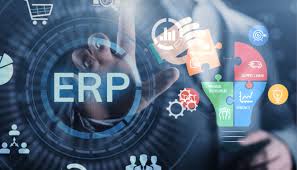Businesses implement ERP system modules worldwide to improve transparency, operational efficiency, and data-driven decision-making. The workplace is going to undergo a significant sea change as a result of all of this. You can appreciate the differences in the types of functionality a firm requires by looking at the ERP modules and functionalities that are used the most.
Eresource Xcel is the best Manufacturing ERP software in India. eresource Xcel enterprise resource planning (ERP) modules list will cover everything from customer relationship management (CRM), scheduling, and barcoded transactions to dashboards. Let’s grasp the meaning of “ERP” before moving on to the other modules.
What do you understand by the term ‘ERP?’
The acronym “Enterprise Resource Planning” refers to a collection of related programs designed to facilitate corporate processes’ management. It is a system that cohesively manages critical company processes and is composed of multiple ERP departmental modules. ERP can manage and automate corporate operations in such a way that they address various aspects, including technology, services, and human resources, to provide a more positive experience for communication between cross-functional departments. These Manufacturing ERP software system modules are meant to make the flow of information between numerous departments, such as sales, inventories, customer relationship management, human resources, and finance, as smooth and easy as possible.
What exactly are ERP Modules, and how can they assist a company?
ERP for manufacturing software typically comes pre-integrated with several different system modules, each of which is designed to be purchased separately by the company based on the requirements of their particular enterprise. The many system modules each contribute to managing a specific aspect of a business process, such as the administration of human resources, inventories, or supply chain management, amongst others.
These ERP modules are beneficial to a firm in a variety of ways, including:
- Increasing efficiency by computerizing and consolidating administrative tasks
- Integrating a large number of systems into a single system so that users may obtain data from all of their sources in a single location
- Contributes to the development of employees’ ability to work together
- Enhanced workflow thanks to better resource planning and the simplification of several business processes
The majority of ERP systems consist of several more advanced modules. These modules of the ERP system are responsible for a wide variety of organizational tasks and responsibilities. Let’s talk about some of the most crucial components of the eresource Xcel ERP system, shall we?
Manufacturing
ERP for manufacturing modules is required to be included in the ERP system of every manufacturing company. It ensures material management, quality control, and expenditures and manages engineering flow at all levels. The Manufacturing ERP module is an automated solution that monitors the day-to-day manufacturing processes. This module is part of the Enterprise Resource Planning system. It ensures that all of the organization’s resources are used effectively and that its manufacturing capacity operates efficiently.
- All of an organization’s purchasing processes are made more efficient due to this.
- Initiate channels of communication with the sales department to obtain details on the orders that have been placed.
- Contributes to the efficient administration of inventories
- It helps estimate future manufacturing requirements, which in turn helps with various vital decisions like hiring, training, and payroll.
- Simple projections of upcoming data and sales orders, allowing for straightforward calculations of anticipated profit.
Management of the Supply Chain
Supply chain management, one of the most common Manufacturing ERP software modules, enable an organization to control the complete flow of materials, beginning with the manufacturer and ending with the final consumer. This flow starts with the retailer and continues to the ultimate customer. This helps to ensure sufficient inventory stock, reducing the risk of a shortage occurring during the production process. The Supply Chain Management ERP module is designed to help streamline all of the primary processes involved in supplying, transporting, and distributing raw materials and finished items.
- When orders are received, the demand requests should be automatically created.
- Develop a job scheduling system and maintain a real-time tracking system for it.
- Control the purchasing and provision of commodities, services, and other resources across the chain efficiently.
- You manage all the processes and aspects within a supply chain, from manufacturing to warehousing and shipping.
- Once production has begun, keep a running tally of all the resources employed—including labor and raw materials.
- After the goods have been delivered to the customer, the invoice should be generated automatically.
Conclusion
Manufacturing ERP software can manage a wide variety of company tasks, enabling it to make an organization more efficient than ever. It is a very cross-functional solution that possesses components that are both spectacular and creative. The next step in the evolution of manufacturing technology is ERP modules. Investing in good ERP software is a way to boost efficiency and earnings while gaining a competitive advantage in the market.









































